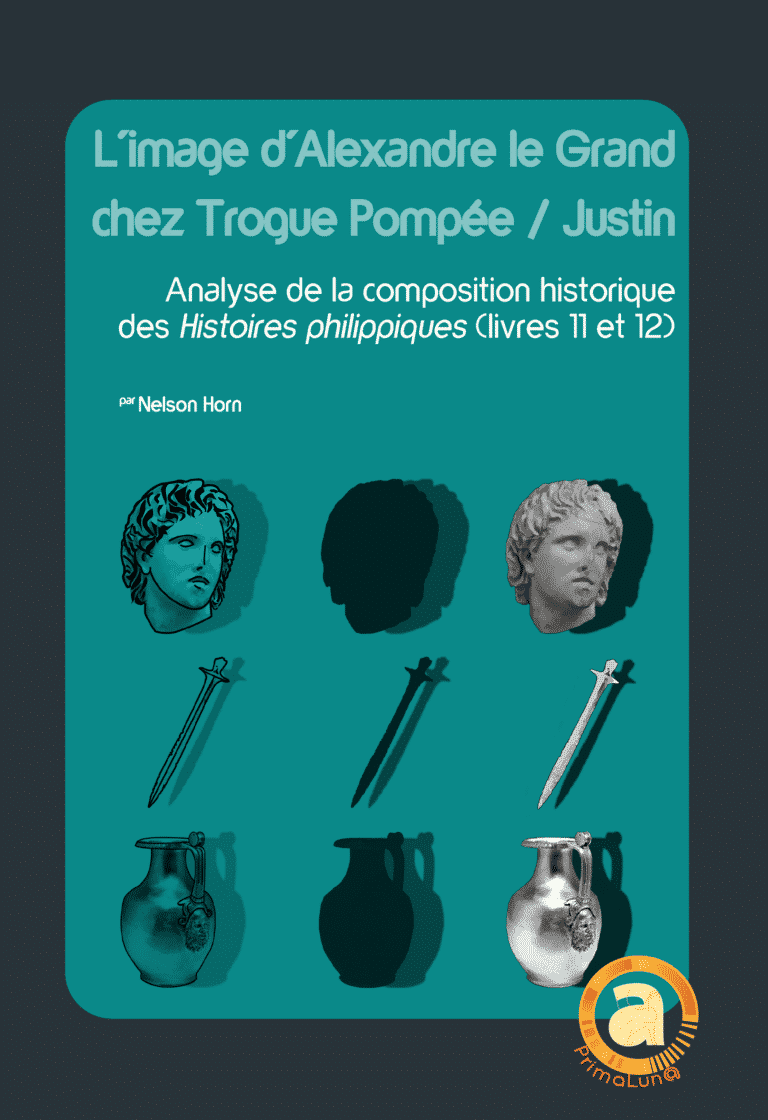Éditions récentes des Histoires philippiques de Justin
- Seel, O., éd. (1935) : M. Iuniani Iustini Epitoma Historiarum Philippicarum Pompei Trogi. Post F. Ruehl. Lipsiae. id. (1972, 1985) : Accedunt Prologi in Pompeium Trogum, Stuttgart (Bibliotheca Teubneriana).
- Chambry, É. & Thely-Chambry, L. (1936) : Justin. Abrégé des Histoires philippiques de Trogue Pompée et Prologues de Trogue-Pompée, 2 vol., Paris.
- Santi Amantini L. (1981) : Storie Filippiche. Epitome da Pompeo Trogo, Milan.
- Yardley J. C. (1994) : Justin. Epitome of the Philippic History of Pompeius Trogus, with Introduction and Explanatory notes by R. Develin, American Philological Association Classical Resources, Atlanta.
- Arnaud-Lindet, M.-P. (2003) : Marcus Junianus Justinus : Abrégé des Histoires Philippiques de Trogue Pompée, [en ligne] http://www.forumromanum.org/literature/justin/introduction.html [consulté le 25 mai 2021].
- Mineo, B. (2016) : Justin : Abrégé des Histoires Philippiques de Trogue Pompée, vol. I, Livres I-X, Paris.
- Horn, N. (2017) : Étude des livres XI et XII des Histoires philippiques de Trogue Pompée / Justin : La composition historique autour de l’image d’Alexandre, thèse dirigée sous la direction de B. Mineo.
- Mineo, B. (2018) : Justin : Abrégé des Histoires Philippiques de Trogue Pompée, vol. II, Livres XI-XXIII, Paris.
- Mineo, B. (2020) : Justin : Abrégé des Histoires Philippiques de Trogue Pompée, vol. III, Livres XXIV-XLIV, Paris.
Ouvrages généraux et articles
Nous indiquons parmi eux les éditions d’auteurs anciens, dont les introductions et les notes ont servi à notre travail.
- Adams, J. N. (1983) : “Words for Prostitute in Latin ”, Rheinisches Museum für Philologie, 126, 322-358.
- Adams, J. N. (19903) : The Latin sexual Vocabulary, Londres.
- Alexandre, S. (2014) :Évaluation et contre-pouvoir : Portée éthique et politique du jugement de valeur dans le stoïcisme romain, Grenoble.
- Alonso Núñez, A. (1987) : “An Augustan World History ”, Greece and Rome, 34, 56-72.
- Alonso Núñez, A. (1995) : “Drei Autoren von Geschichtabrissen der römischen Kaiserzeit : Florus, Iustinus, Orosius ”, Latomus, 54, 346-59.
- Altheim, F. et Stiehl, R. (1964) : Die Araber in der alten Welt, 1, Berlin.
- André, J. et Filliozat, J. (1986) : L’Inde vue de Rome : Textes latins de l’Antiquité relatifs à l’Inde, Paris.
- Andre, J.-M. (1974) : Le Siècle d’Auguste, Paris.
- Andrisano, A. M. (2003) : “Les Performances du Symposion de Xénophon ”, Pallas, Revue d’Études Antiques, 61/2003, Symposium : Banquet et représentations en Grèce et à Rome, Toulouse-Le Mirail, 287-302.
- Atkinson, J. E. (1980) : A Commentary on Q. Curtius Rufus’ Historiae Alexandri Magni, Books 3 and 4, Amsterdam.
- Atkinson, J. E. (1994) : A Commentary on Q. Curtius Rufus’ Historiae Alexandri Magni, Books 5 to 7.2, Amterdam.
- Atkinson, J. E. (2000) : “Originality and its Limits in Alexander Sources of the Early Empire ”, in : Bosworth & Baynham 2000, 308.
- Atkinson, J. E. (2009) : Curtius Rufus Histories of Alexander the Great Book 10, Introduction and Historical Commentary by J. E. Atkinson, translated by J. C. Yardley, Oxford.
- Auberger, J. (2005) : Historiens d’Alexandre, Paris.
- Aymard, A. (1954) : “Philippe de Macédoine otage à Thèbes ”, Revue des Études Anciennes, 56, 15-36.
- Badian, E. (1960) : “The Murder of Parmenio ”, Transactions of the American Philological Association, 91, 324-338.
- Badian, E. (1961) : “Harpalus ”, Journal of Hellenistic Studies, 81, 16-41.
- Badian, E. (1965) : “The Administration of the Empire ”, Greece & Rome, 12, 166.
- Badian, E. (1965) : “Alexander in Iran ”, in : Gershevitch 1965.
- Badian, E. (1967) : “Agis III ”, Hermes 95, 170–92.
- Ballesteros Pastor, L. (2013) : Pompeyo Trogo, Justino y Mithridates, Comentario al Epitome de las Historias Filipicas (37, 1, 6 – 38, 8 1), Zürich / New York.
- Balsdon, J.P.V.D. (1950) : “The Divinity of Alexander ”, Historia : Zeitschrift für Alte Geschichte, 1, 363-388.
- Battistini, O. et Charvet, P. (2004) : Alexandre le Grand, Histoire et dictionnaire, Paris.
- Bardon, H. (1947) : Quinte-Curce : Histoires, vol. 1, Livres III-VI, Paris.
- Bardon, H. (1948) : Quinte-Curce : Histoires, vol. 2, Livres VII-X, Paris.
- Bayer, J. (1939) : “L’Immortalité astrale d’Auguste, ou Manilius commentateur de Virgile ”, Revue des Études Latines, 141-171.
- Baynham, E. (1998) : Alexander the Great. The Unique History of Quintus Curtius, Ann Arbor, The University of Michigan Press.
- Baynham, E. (2009) : “Barbarians I : Quintus Curtius’ and other Roman Historians’ Reception of Alexander ”, in : Feldherr 2009, 288-300.
- Bearzot, C., et Landucci, F., éd. (2014) : Studi sull’epitome di Giustino, 1, Milan.
- Bearzot, C., et Landucci, F., éd. (2016) : Studi sull’epitome di Giustino, 2, Milan.
- Berve, H. (1926) : Das Alexanderreich auf prosopographischer Grundlager, 2 vol., Münich.
- Billows, R. A. (1990) : Antigonos the One-Eyed and the Creation of the Hellenistic State, Berkeley et Los Angeles.
- Bing, D. J. (1989) : “Reattribution of the ‘Myriandrus̕ Alexanders : The Case of Issus ”, Journal of Hellenic Studies, 111, 161-165.
- Borgna, A. (2018) : Ripensare l’historia universale : Giustino e l’Epitome delle Storie Filippiche di Pompeo Trogo, Georg Olms Velrag Hildesheim / Zürich / New York.
- Bornecque, H. (1932) : Sénèque le Rhéteur, Controverses et Suasoires, 2 vol., Paris.
- Borza, E.N. (1972) : “Fire from Heaven : Alexander at Persepolis ”, Classical Philology, 67, No. 4, 233-245.
- Bosworth, A. B. (1980) : “Alexander and the Iranians ”, Journal of Hellenic Studies, 100, 1-21.
- Bosworth, A. B. (1980, 1995) : A Historical Commentary on Arrian’s History of Alexander, 1 et 2, Oxford.
- Bosworth, A. B. (1986) : “Alexander the Great and the Decline of Macedon ”, Journal of Hellenic Studies, 106, 1-12.
- Bosworth, A. B. (1988) : From Arrian to Alexander : Studies in Historical Interpretation, Oxford.
- Bosworth, A. B. (1989) : Conquest and Empire : The Reign of Alexander the Great, Cambridge.
- Bosworth, A. B. (1997) : “Alexander and Ammon ”, in : Kinzl 1997, 51-75.
- Bosworth, A. B. (2008) : “Alexander, and the Pursuit of Glory ”, in : Marincola 2008.
- Bosworth, A. B. et Baynham, E., éd. (2000) : Alexander the Great in Fact and Fiction, Oxford.
- Boulanger, A. et Wuilleumier, P. (1959) : Cicéron : Discours, Philippiques I à IV, Paris.
- Braccesi., L., éd. (1993), L’Alessandro di Giustino (dagli antichi ai moderni), Rome.
- Briant, P. (1982) : Rois, Tributs et Paysans : Études sur les formations tributaires du Moyen-Orient ancien, Paris.
- Briant, P. (1996) : Histoire de l’empire perse, de Cyrus à Alexandre, Paris.
- Briant, P. (2003) : Darius dans l’ombre d’Alexandre, Paris.
- Briant, P. (20117) : Alexandre le Grand, Paris.
- Briquel, D., et Thuillier, J.-P., éd. (2001) : Le Censeur et les Samnites : Sur Tite-Live, livre IX, Paris.
- Brooks, E. Jr. (1970) : P. Rutilii Lupi : De Figuris Sententiarum et Elocutionis, Leiden.
- Brunt, P. A. (1976, 1983) : Arrian, Anabasis Alexandri, 1 et 2, Loeb Classical Library, Cambridge.
- Buckler, J. M. H. (1980) : The Theban Hegemony, 371-362 BC, Harvard.
- Burstein, S. M. (1989) : Agatharchides of Cnidus : On the Erythraean Sea, Londres.
- Caire, É. et Pittia, S., éd. (2006) : Guerre et diplomatie romaines, ive-iiie siècles av. J.-C., Pour un réexamen des sources), Université de Provence.
- Canfora, L. (20093) : César, le Dictateur démocrate, Paris.
- Carcopino, J. (19685) : Jules César, Paris.
- Carney, E. (1981) : “The Death of Clitus ”, Greek, Roman and Byzantine Studies, 22, 149-160.
- Carney, E. (1996) : “Macedonians and Mutiny: Discipline and Indiscipline in the Army of Philip and Alexander ”, Classical Philology, 91, no 1, 19-44.
- Carney, E. et Ogden, D., éd. (2010) : Philip II and Alexander the Great : Father and Son, Lives and Afterlives, Oxford.
- Casson, L. (1974) : Travel in the Ancient World, Londres.
- Cauer, F. (1894) : “Philotas, Kleitos, Kallisthenes : Beiträge zur Alexandergeschichte ”, Neue Jahrbücher für classische Philologie, Supplbd 20.
- Chamoux, F. (1986) : Marc Antoine, dernier prince de l’Orient grec, Paris.
- Chaumartin, F.-R. (1985) : Le De Beneficiis de Sénèque, sa signification philosophique, politique et sociale, Lille.
- Citroni, M. (2009) : “Res publica restituta et la représentation du pouvoir augustéen dans l’œuvre d’Horace ”, in : Hurlet et Mineo 2009, 9-22.
- Combès, R. (1966) : Imperator (Recherches sur l’emploi et la signification du titre d’imperator dans le Rome républicaine), Paris.
- Cresci Marrone, G. (1993) : “L’Alessandro di Trogo : per una definizione dell’ideologia ”, in : Braccesi 1993, 11-43.
- Croiset, A. et Croiset, M. (1899) : Histoire de la Littérature Grecque, Paris.
- Delaygue-Masson, M.-P. (2008) : La Grèce d’Alexandre et son rêve d’Orient, La conquête de l’empire perse : un autre mythe, une autre réalité de l’Orient, Paris.
- Deleplace, M., éd. (2009) : Les Discours de la haine. récits et figures de la passion dans la cité, Villeneuve d’Ascq.
- Devillers, O. et Battistin Sebastiani, B. (2021) : Sources et modèles des historiens anciens, vol. 2, Ausonius Scripta Antiqua 145, Bordeaux.
- Droysen, J. G. (2003) : Histoire de l’Hellénisme, traduit de l’allemand sous la direction d’A. Bouché-Leclercq, Paris.
- Duhot., J.-N. (1989) : La Conception stoïcienne de la causalité, Paris.
- Dumézil, G. (1985) : “Le Costume de guerre du dernier Darius ”, Mélanges Tucci, 1, Rome, 261-265.
- Dunkle, J. R. (1967) : “The Greek Tyrant and Roman political Invective ”, Transactions and Proceedings of the American Philological Association, 98, 151-171.
- Dupont, F. (1977) : Le Plaisir et la loi : du “Banquet ” de Platon au “Satiricon ”, Paris.
- Dupont, F. (1988) : Le Théâtre latin, Paris.
- Dupont, F. (1995) : Les Monstres de Sénèque : Pour une dramaturgie de la tragédie romaine, Paris.
- Dupont, F. (2000) : Médée de Sénèque ou Comment sortir de l’humanité, Paris.
- Dupont, F. (2002) : “Rome ou l’altérité incluse ”, in : Revue Descartes, n°37.
- Dupont, F. et Eloi, T. (2001) : L’Érotisme masculin dans la Rome antique, Paris.
- Eddy, S. K. (1961) : The King is dead, Studies in the Near-Eastern resistance to Hellenism, Lincoln.
- Edmunds, L. (1971) : “The Religiosity of Alexander ”, Greek, Roman and Byzantine Studies, 12, 363-391.
- Edwards, C. (1993) : The Politics of Immorality in Ancient Rome, Cambridge.
- Eggermont, P. H. L. (1975) : Alexander’s Compaigns in Sind and Baluchistan and the Siege of the Barhmin Town of Harmatelia, Leuven.
- Engels, D. W. (1978) : Alexander the Great and the Logistics of Macedonian Army, Berkeley et Los Angeles.
- Engels, D. W. (1978) : “A Note on Alexander’s Death ”, Classical Philology, 73, n°3, 224-228.
- Errington, R. M. (1978) : “The Nature of the Macedonian State under the Monarchy ”, Chiron, 8, 77-134.
- Étienne, R. (19892) : Le Siècle d’Auguste, Paris.
- Fears, J. R. (1974) : “The Stoic View of the Career and Character of Alexander the Great ”, Philologus, 118, 113-130.
- Feldherr, A., éd (2009) : The Cambridge Companion to the Roman Historians, Cambridge.
- Fillion-Lahille, J. (1984) : Le De Ira de Sénèque et La Philosophie stoïcienne des passions, Paris.
- Flacelière, R. et Chambry, É. (1975) : Plutarque : Vies, t. IX, Alexandre-César, Paris.
- Frei, P. (1972) : “Der Wagen von Gordion ”, Museum Helveticum, 29, 110-123.
- Foucault, J. (1972) : Recherches sur la langue et le style de Polybe, Paris.
- Fredericksmeyer, E. A. (1986) : “Alexander’s Kausia and Macedonian Tradition ”, Transactions of the American Philological Association, 116, 217-227.
- Fredericksmeyer, E. A. (1990) : “Philip and Alexander, Emulation and Resentment ”, Classical Journal, 85, 300-315.
- Fredericksmeyer, E. A. (2003) : “Alexander’s Religion and Divinity ”, in : Roisman 2003, 253-278.
- Fuller, J. F. C. (1958) : The Generalship of Alexander the Great, Londres.
- Galdi, M. (1922) : L’epitome nella letteratura latina, Naples.
- Gershevitch, I, éd. (1965) : The Cambridge History of Iran, 2, Cambridge.
- Giovanelli-Jouanna, P. (2011) : “Arrien de Nicomédie ”, in : Lenfant 2011, 48-65.
- — (2011) : “Épitomé de Metz ”, in : Lenfant 2011, 191-194.
- Giovanelli-Jouanna, P. & Maisonneuve, C. (2011) : “Diodore de Sicile ”, in : Lenfant 2011, 119-152.
- Green, P. (1978) : “Caesar and Alexander : Aemulatio, Imitatio, Comparatio ”, American Journal of Ancient History, 3, 1-26.
- Green, P. (1991) : Alexander of Macedon, Berkeley / Los Angeles / Oxford.
- Goukowsky, P. (1969) : “Clitarque seul ? Remarques sur les sources du livre XVII de Diodore de Sicile ”, Revue des Études Anciennes, 71, n°3-4, 320-337.
- Goukowsky, P. (1976) : Diodore de Sicile : Bibliothèque historique, Livre XVII, Paris.
- Goukowsky, P. (1978-1981) : Essai sur les origines du mythe d’Alexandre (336-270 av. J.-C.), vol. I : Les origines politiques ; vol. II : Alexandre et Dionysos, Nancy.
- Goulet-Cazé, M.-O., éd. (2011) : Études sur la théorie stoïcienne de l’action, Paris.
- Graeve, V. von (1970) : Der Alexandersarkophag und seine Werkstatt, Berlin.
- Gruen, E. S. (1974) : The Last Generation of the Roman Republic, Berkeley / Los Angeles / Londres.
- Hamilton, J. R. (1953) : “Alexander and his ‘so-called̕ Father ”, Classical Quarterly, 3, 151-157.
- Hamilton, J. R. (1961) : “Cleitarchus and Aristobulus ”, Historia, 10, 448-458.
- Hamilton, J. R. (1969) : Plutarch, Alexander : A Commentary, Oxford.
- Hammond, N. G. L. (1978) : “’Philip’s Tomb̕ in Historical Context ”, Greek Roman and Byzantine Studies, 19, 331-350.
- Hammond, N. G. L. (1989) : The Macedonian State : The Origins, Institutions and History, Oxford.
- Hammond, N. G. L. (1989) : “Casualties and Reinforcements of Citizen Soldiers in Greece and Macedonia ”, Journal of Hellenic Studies, 109, 56-68.
- Hammond, N. G. L. (1997) : “The archaeological and literary Evidence for the Burning of the Persepolis Palace ”, Classical Quaterly, 42, 358-364.
- Hammond, N. G. L. (2002) : Le Génie d’Alexandre le Grand, traduit de l’anglais par P. Kobis, Paris.
- Hammond, N. G. L. (2007) : Sources for Alexander the Great, An Analysis of Plutarch’s ‘Life’ and Arrian’s ‘Anabasis Alexandrou’, Cambridge.
- Hammond, N. G. L. (2007) : Three Historians of Alexander the Great, Cambridge.
- Heckel, W. (1980) : “Alexander at the Persian Gates ”, Athenaeum, 58, 168-174.
- Heckel, W. (1981) : “Polyxena, the Mother of Alexander the Great ”, Chiron 11, pp. 79-96.
- Heckel, W. (1986) : “Somatophylakia : A Macedonian cursus honorum ? ”, Phoenix, 40, 279-294.
- Heckel, W. (1988) : The last Days and Testament of Alexander the great : a prosopographic study, Stuttgart.
- Heckel, W. (1992) : The Marshals of Alexander’s Empire, Londres.
- Heckel, W. (2006) : Who’s who in the Age of Alexander the Great. Prosopography of Alexander’s Empire, Oxford.
- Hellegouarc’h, J. (19722) : Le Vocabulaire latin des relations et des partis politiques sous la République, Paris.
- Herzfeld, E. (1968) : The Persian Empire. Studies in Geography and Ethnography of the Ancient Near East, Wiesbaden.
- Hill, G. F. (1906) : Historical Greek Coins, Londres.
- Hinard, F. (1985) : Sylla, Paris.
- Horn, N. (2017) : Étude des livres XI et XII des Histoires philippiques de Trogue Pompée / Justin : La composition historique autour de l’image d’Alexandre, thèse dirigée sous la direction de B. Mineo.
- Horn, N. (2019) : “Les Histoires philippiques de Trogue Pompée / Justin : Une œuvre, deux auteurs, deux époques, deux projets ”, Revue des Études latines, 121, 71-182.
- Horn, N. (2021) : “La construction de l’image d’Alexandre le Grand par Trogue Pompée / Justin : Perspectives morales et politiques”, in : Devillers & Battistin, éd. 2021, 195-212.
- Humm, M. (2006) : “Rome face à la menace d’Alexandre le Grand ”, in : Caire & Pittia 2006, 175-196.
- Hurlet, F. (1997) : Les Collègues du prince sous Auguste et Tibère, Rome.
- Hurlet, F. (2009) : “L’Aristocratie augustéenne et la Res publica restituta ”, in : Hurlet & Mineo 2009, 73-99.
- Hurlet, F. & Mineo, B., éd. (2009) : Le Principat d’Auguste : Réalités et représentations du pouvoir autour de la Res publica restituta, Rennes.
- Hurlet, F. & Mineo, B. (2009) : “Res publica restituta : Le Pouvoir et ses représentations à Rome sous le principat d’Auguste ”, in : Hurlet & Mineo 2009, 9-22.
- Ildefonse, F. (20042) : Les Stoïciens I, Zénon, Cléanthe, Chrysippe, Paris.
- Ildefonse, F. (2011) : “La Psychologie de l’action ”, in : Goulet-Cazé 2011, 1-71.
- Jacoby, F. (1962) : Die Fragmente der Griechischen Historiker, 2, Leiden, 618-828.
- Jal, P. (1987) : “À propos des Histoires Philippiques. Quelques remarques ”, Revue des Études Latines, 65, 194-209.
- Jones, C.P. (1966) : “Towards a Chronology of Plutarch’s Works ”, Journal of Roman studies, 56, 61-74.
- Kaerst, J. (1926-1927) : Geschichte des Hellenismus, 2 vol., Leipzig / Berlin.
- Keppie, L. (1984) : The Making of the Roman Army, Londres.
- Kinzl, K. H., éd. (1997) : Greece and the Eastern Mediterranean in Ancient History and Prehistory. Studies Presented to Fritz Schachermeyer on the Occasion of his Eightieth Birthday, Berlin / New York.
- Krishna Gairola, G. (1955) : “Les Conditions religieuses et sociales à l’époque Saravahana dans l’Inde, Ier s. av. J.-C.-iie s. ap. J.-C. ”, Journ. As., 243.
- Kornemann, E. (1935) : Die Alexandergeschichte des Königs Ptolemaios von Aegypten, Berlin.
- Lancel, S. (1985) : “Y a-t-il une africitas ”, Revue des Études Latines, 63, 161-182.
- Landucci, F. (2014) : “Filippo II e le Storie Filippiche : un protagonista storico e storiografico ”, in : Bearzot & Landucci 2014.
- Landucci Gattinoni, F. (1992) : Lisimaco di Tracia nella prospettiva del primo ellenismo, Milan.
- Laurand, V. (2002) : Le Vocabulaire des Stoïciens, Paris.
- Laurand, V. (2005) : La Politique stoïcienne, Paris.
- Lenfant, D., éd. (2011) : Les Perses vus par les Grecs, Paris.
- Levi, M. A. (1977) : Alessandro Magno, Milan.
- Arnaud-Lindet, M.-P. (2001) : Histoire et politique à Rome, Les Historiens romains iiie siècle av. J.-C.- ve siècle ap. J.-C., Paris.
- Lytton, R. H. (1973) : Justin’s Account of Alexander the Great: A Historical Commentary : a Thesis in History, Pennsylvania State University.
- Mahé-Simon, M. (2001) : “L’Enjeu historiographique de l’excursus sur Alexandre (IX, 16, 11 – 19, 17) ”, in : Briquel & Thuillier 2001, 37-63.
- Mahé-Simon, M. (2006) : “Alexandre le Molosse et les Romains, pax ou amicitia ? ”, in : Caire et Pittia 2006, 197-207.
- Maisonneuve, C. (2011) : “Éphore de Kymè ”, in : Lenfant 2011, 184-191.
- Marincola, J., éd. (2008) : A Companion to greek and roman Historiography, Oxford.
- Martin, P. M. (1982) : L’Idée de royauté à Rome : de la Rome royale au consensus républicain, Clermont-Ferrand.
- Martin, P. M. (1994) : L’Idée de royauté à Rome : haine de la royauté et seductions monarchiques (du ive siècle av. J.-C. au principat augustéen), Clermont-Ferrand.
- Martin, P. M. (2009) : “Un exemple parfait de haine politique : Cicéron et Antoine ”, in : Deleplace 2009, 49-62.
- Mattern, S. P. (1999) : Rome and the Enemy : Imperial Strategy in the Principate, Berkeley, Los Angeles / Londres.
- McCrindle, J. W. (1886, 1969) : The Invasion of India by Alexander the Great, Londres.
- McQueen, E. I. (1978) : “Some Notes on the Antimacedonian Movement in the Peloponnese in 331 B.C. ”, Historia, 27, 40–64.
- Mederer, E. (1936) : Die Alexanderlegenden bei den ältesten Alexanderhistoriken, Stuttgart.
- Milns, R. D. (1968) : Alexander the Great, Londres.
- Milns, R. D. (1968) : “The Army of Alexander the Great ”, Alexandre le Grand, Image et réalité, Londres.
- Mineo, B. (2006) : Tite-Live et l’histoire de Rome, Paris.
- Mineo, B. (2009) : “La Res publica restituta livienne : un pari sur l’avenir ”, in : Hurlet & Mineo 2009, 9-22.
- Mossé, C. (2001) : Alexandre : La Destinée d’un mythe, Paris.
- Müller, K. (1841-1870) : Fragmenta Historicorum Graecorum, Paris.
- Nadeau, R. (2010) : Les Manières de table dans le monde gréco-romain, Rennes-Tours.
- O’Brien, J. M. (1980) : “The Enigma of Alexander : The Alcohol Factor ”, Annals of Scholarship, 1, 31-46.
- O’Brien, J. M. (1992) : Alexander the Great : The Invisible Enemy, Londres.
- Orfanos, C. (2003) : “Ecclesia vs Banquet ”, Pallas, revue d’études antiques, 61/2003, Symposium : Banquet et représentations en Grèce et à Rome, Toulouse-Le Mirail, 203-217.
- Parke, H. W. (1967) : The oracles of Zeus, Dodona, Olympia, Ammon, Oxford.
- Pearson, L. (1960) : The lost histories of Alexander the Great, Providence.
- Pedech, P. (1984) : Historiens Compagnons d’Alexandre, Paris.
- Pernot, L. (2013) : Alexandre le Grand : Les risques du pouvoir, Paris.
- Perrin, B. (1895) : “The Genesis and Growth of an Alexander Myth ”, Transactions of the American Philological Association, 26, 56-68.
- Pfister, F. (1964) : “Alexander der Grosse. Die Geschichte seines Ruhms ”, Historia, 13.
- Pigeaud, J. (1989) : La Maladie de l’âme : Etude sur la relation de l’âme et du corps dans la tradition médico-philosophique antique, Paris.
- Pollitt, J. J. (1990) : The Art of Ancient Greece, Sources and Documents, Cambridge.
- Prandi, L. (2016) : “Alessandro il Grande in Giustino ”, in : Bearzot & F. Landucci 2016.
- Prandi, L. (2016) : “Kleitarchos ”, in : Worthington 2016.
- Prost, F. (2009) : “Cicéron, Laelius de amicitia ”, Vita Latina, 180, 98-109.
- Puccini-Delbey, G. (2007) : La Vie sexuelle à Rome, Paris.
- Radet, G. (1927) : “Notes sur l’histoire d’Alexandre. VII. La Prise de Persépolis ”, Revue des Études Anciennes,29, 5-34.
- Radet, G. (1931) : Alexandre le Grand, Paris.
- Rambaud, M. (1952) : L’Art de la déformation historique dans les Commentaires de César, Paris.
- Rawlinson, G. (1889) : History of Phoenicia, Londres.
- R. Roisman, R., éd. (2003) : Brill’s Companion to Alexander the Great, Leyde.
- R. Roisman (2011) : “The Silver Shields, Eumenes and their Historians ”, Creating a Hellenestic World, 61-82.
- Roller, L. E. (1984) : “Midas and the Gordian Knot ”, Classical Antiquity, 3, 256-271.
- Ruberto, A. (2014) : “La Persian el IV secolo e il libro X dell’Epitome di Giustino ”, in : Bearzot & Landucci 2014.
- Salles, C. (2011) : L’amour au temps des Romains, Paris.
- Sandbach, F. H. (1975) : The Stoics, Londres.
- Savinel, P. (1984) : Arrien : Histoire d’Alexandre, L’anabase d’Alexandre le Grand, Paris.
- Schachermeyr, F. (1949) : Alexander der Grösse : Ingenium und Macht, Graz-Vienne.
- Schachermeyr, F. (1970) : Alexander in Babylon und die Reichsordnung nach seinem Tode, Vienne.
- Schachermeyr, F. (1973) : Alexander der Grösse. Das Problem seiner Persönlichkeit und seines Wirkens, Vienne.
- Schanz, M. & Hosius, C. (1967) : Geschichte der Römischen Literatur, 2, Münich.
- Scheid, J. (2009) : “Les Restaurations religieuses d’Octavien/Auguste ”, in : Hurlet & Mineo 2009, 119-128.
- Schmidt, E. F. (1953) : Persepolis I : Structures, Reliefs, Inscriptions, Chicago.
- Schmidt, E. F. (1957) : Persepolis II : Contents of the Treasury and Other Discoveries, Chicago.
- Schmidt, E. F. (1970) : Persepolis III : The Royal Tombs and Other Monuments, Chicago.
- Schmitthenner, W. (1968) : “Über eine Formveränderung der Monarchie seit Alexander d. Grossen ”, Saeculum, 19, 31-46.
- Schmitt Pantel, P. (1992) : La Cité au banquet : Histoire des repas publics dans les cités grecques, Rome-Paris, Ecole française de Rome.
- Scott, K. (1929) : “Octavian’s Propaganda and Antony’s De Sua Ebrietate ”, Classical philology, 24, 133-141.
- Seel, O. (1955) : Die Praefatio des Pompeius Trogus, Erlangen.
- Seel, O. (1956) : Pompei Trogi Fragmenta. Lipsiae. (Bibliotheca Teubneriana).
- Seel, O. (1972) : M. Iunianus Iustinus, Auszug aus der Weltgeschichte des Pompeius Trogus, Zürich / Stuttgart.
- Seel, O. (1972) : Eine römische Weltgeschichte, Nuremberg.
- Seltman, C. (19552) : Greek Coins, Londres.
- Sissa, G. (20112) : Sexe et sensualité : La Culture érotique des Anciens, Paris.
- Sonny, A. (1886), “Vergil and Trogus ”, Rheinisches Museum für Philologie, 41, 473-480.
- Steele, R.B. (1917) : “Pompeius Trogus and Justinus ”, American Journal of Philology, 38, 19-41.
- Stein, A. (1943) : “On Alexander’s Route into Gedrosia ”, Geographical Journal, 102, 193-227.
- Suspène, A. (2009) : “Aspects numismatiques de la Res publica restituta augustéenne ”, in : Hurlet & Mineo 2009, 9-22.
- Syme, R. (1956) : “Some Friends of the Caesars ”, AJPh, 77, 264-273.
- Syme, R. (19624) : The Roman Revolution, Oxford.
- Syme, R. (1991) : Roman Papers, 6, Oxford.
- Talbert, R. A. J. (1985) : Atlas of Classical History, Londres.
- Tallet-Bonvalot, A. (1994) : Roman d’Alexandre, Paris.
- Tarn, W. W. (1948) : Alexander the Great, 1 et 2, Cambridge.
- Tarn, W. W. (1951) : The Greeks in Bactria and India, Cambridge.
- Unz, R. (1985) : “Alexander’s Brothers ”, Journal of Hellenic Studies, 105, 171-174.
- Vidal-Naquet, P. (1984) : “Flavius Arrien entre deux mondes ”, in : Savinel 1984, 309-394.
- Weigall, A. (1955) : Alexandre le Grand, traduction de l’anglais par T. Varlet, Paris.
- Welles, C. B. (1963) : Diodorus of Sicily, Loeb Classical Library, 8, Cambridge.
- Werner, R. (1987) : “Alexander der Molosser in Italien ”, in : Will et Heinrich 1987, 335-390.
- Westlake, H. D. (1935) : Thessaly in the Fourth Century BC, Londres.
- Wilbert, D. N. (1989) : Persepolis. The Archeology of Parsa, Seat of the Persian Kings, Princeton.
- Wilcken, U. (19672) : Alexander the Great (trad. G. C. Richards ; notes par E. N. Borza), New York.
- Will, W. et Heinrich, J., éd. (1987) : Zu Alexander der Große, Amsterdam.
- Woodman, A. J. (1983) : Velleius Paterculus : The Caesarian an Anugustan Narrative (2.41-93), Cambridge.
- Wooten, C. (1975) : “Le Développement du style asiatique pendant l’époque hellénistique ”, Revue des Études Grecques, 88, fascicule 419-423, 94-104
- Worthington, I. (2010) : “’Worldwide Empire̕ versus ‘Glorious Enterprise̕ : Diodorus and Justin on Philip II and Alexander the Great ”, in : Carney & Ogden 2010.
- Worthington, I. (2014) : By the Spear : Philip II, Alexander the Great, and the Rise and Fall of the Macedonian Empire, Oxford.
- Worthington, I., éd. (2016) : Brill’s New Jacoby, Leiden.
- Yakoubovitch, I. (2015) : Les Historiae Alexandri Magni de Quinte-Curce : Le Mythe d’Alexandre et la Représentation du pouvoir à Rome (Ier s. ap. J.-C.), thèse dirigée par C. Guittard.
- Yardley, J.-C., W. Heckel, W. (1997) : Justin Epitome of the Philippic History of Pompeius Trogus. Vol. 1. Books 11-12, Oxford.
- Zambrini, A. (2008) : “The Historians of Alexander the Great ”, in : Marincola 2008.




